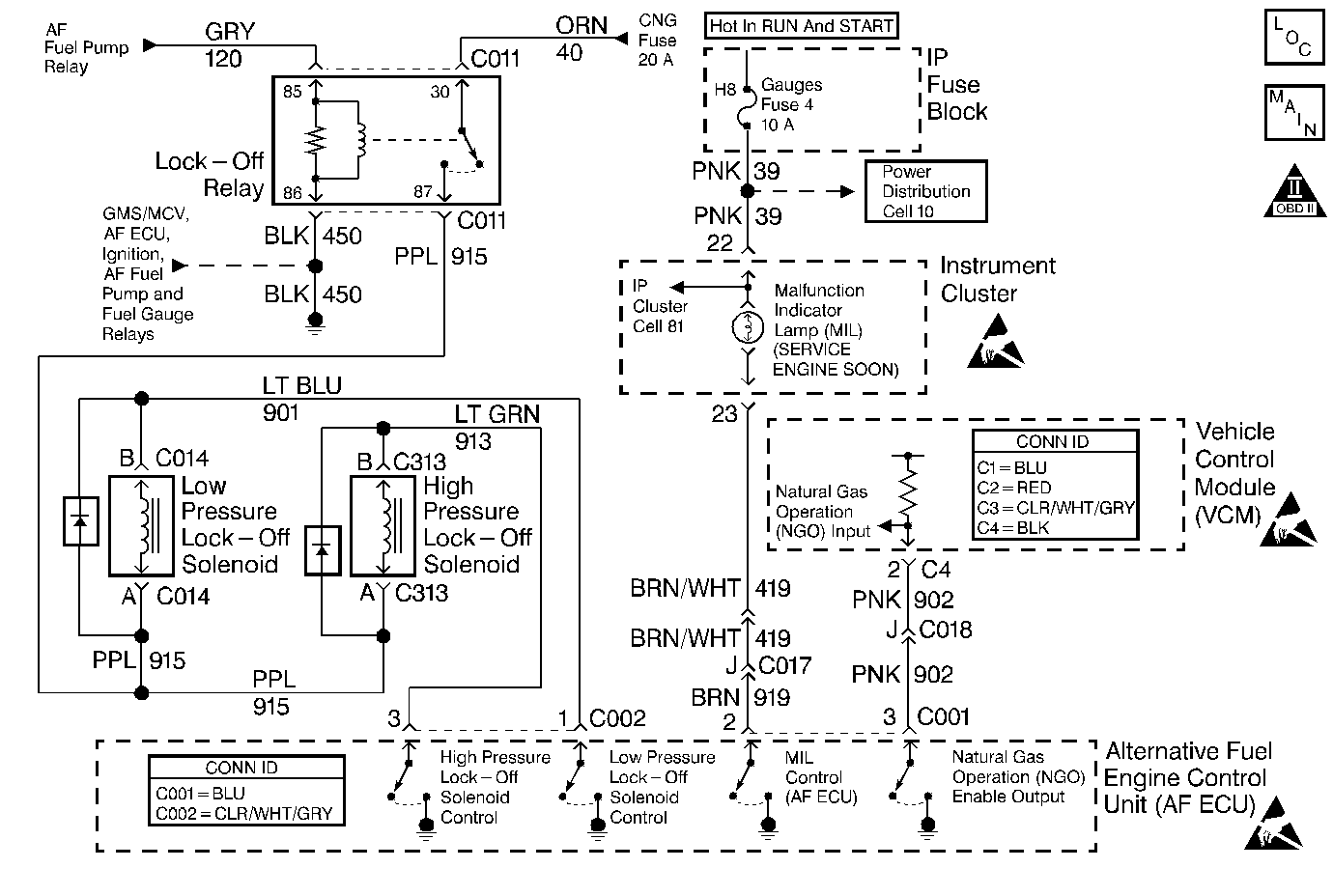
Circuit Description
The AF ECU contains electronic devices called output driver modules. The output driver modules provide switchable outputs (control circuits) for operating solenoids, relays, telltales and other devices. Each of the outputs has an internal fault line that the AF ECU can monitor for faulted circuit conditions.
Two types of outputs can be utilized. High side drivers supply voltage on the control circuit. Low side driverssupply a ground on the control circuit. Currently all monitored outputs are low side drivers. In order for the fault line to detect a failure the state of the control circuit must be opposite of the expected state. If the AF ECU is commanding an output ON, then 0 volts should be monitored by the fault line. If the AF ECU is commanding an output OFF then the voltage supplied to the controlled device should be monitored by the fault line.
This DTC is used to indicate that the AF ECU fault line has monitored a control circuit fault.
Monitored control circuits include the following:
| • | The MIL control (AF ECU) control circuit |
| • | The NGO Enable Output control circuit |
| • | The High Pressure Lock-Off solenoid control circuit |
| • | The Low Pressure Lock-Off solenoid control circuit |
Conditions for Running the DTC
The ignition is ON.
Conditions for Setting the DTC
The AF ECU monitors a control circuit fault for at least 1 second continuously.
Action Taken When the DTC Sets
| • | The AF ECU will illuminate the MIL and store the DTC as History during ONE drive trip in which the diagnostic runs and fails. |
| • | The AF ECU will record operating conditions at the time the DTC sets. This information will be stored as Freeze Frame data. |
Conditions for Clearing the MIL/DTC
| • | The Last Test Failed status will clear when the DTC runs and passes. |
| • | The AF ECU will turn OFF the MIL after 3 consecutive drive trips that the DTC runs and passes. |
| • | The History status will clear after 40 consecutive WARM-UP cycles with NO failures of ANY DTC. |
| • | All DTC Information can be cleared using a scan tool. |
| • | Interruption of Control Module (AF ECU / VCM / PCM or ECM) power or ground MAY clear DTC Information. Clearing DTC Information with this method is inconsistent and should not be performed. |
Diagnostic Aids
Fault Not Present
Fault Not Present indicates the condition that caused the DTC to set is intermittent and not currently present. Refer to Intermittent Conditions for additional information. If any additional DTCs were stored proceed to the applicable DTC table in the order stated in the OBD System Check.
Test Description
The numbers below refer to the step numbers on the diagnostic table.
-
This step determines if the MIL Control circuit is the cause of the fault condition.
The MIL should illuminate with the ignition ON and the engine OFF.
-
This step determines if the MIL Control circuit is the cause of the fault condition.
Step | Action | Value(s) | Yes | No | ||||||||||||
|---|---|---|---|---|---|---|---|---|---|---|---|---|---|---|---|---|
1 | Were you sent here from the AF Powertrain On-Board Diagnostic (OBD) System Check? | -- | Go to Alternative Fuels (AF) Powertrain On Board (OBD) System Check | |||||||||||||
Is the MIL illuminated? | -- | |||||||||||||||
Is the MIL illuminated while commanded OFF? | -- | |||||||||||||||
4 |
Do both displays indicate the same information? | -- | ||||||||||||||
5 |
Do both displays indicate the same information? | -- | ||||||||||||||
6 |
Is the engine operating on Alternative Fuel? | -- | ||||||||||||||
7 | The fault is not present. Refer to Diagnostic Aids. Are any DTCs stored that have not been diagnosed? | -- | Go to Intermittent Conditions | |||||||||||||
8 |
Does the NGO Enable Input data parameter indicate gasoline? | -- | ||||||||||||||
9 |
If the jumper fuse opens, the NGO enable circuit is shorted to voltage. Does the NGO Enable Input data parameter indicate alternative fuel is enabled? | -- | ||||||||||||||
10 |
Does the nNatural Gas Operation data parameter indicate Gasoline is enabled? | -- | ||||||||||||||
11 |
Is the test lamp illuminated with the engine running? | -- | Go to Lock-Off Relay Diagnosis | |||||||||||||
12 |
Is the resistance within the specified range? | 6.2-10 ohms | ||||||||||||||
13 |
Is the resistance within the specified range? | 16.3-20.6 ohms | ||||||||||||||
14 |
Is either resistance not infinite? | ∞ | ||||||||||||||
15 |
Was a wiring or terminal repair necessary? | -- | ||||||||||||||
16 |
Was a wiring repair necessary? | -- | ||||||||||||||
17 |
Was a wiring repair or AF diode replacement necessary? | -- | ||||||||||||||
18 | Replace the required lock-off solenoid. Refer to High Pressure Lock-Off Solenoid Replacement or Low Pressure Lock-Off Solenoid Replacement . Is the replacement complete? | -- | -- | |||||||||||||
19 | Repair the short to ground in the Solenoid Control circuit. Is the repair complete? | -- | -- | |||||||||||||
20 |
Was a repair necessary? | -- | ||||||||||||||
21 | Replace the AF ECU. Refer to Engine Control Unit Replacement . Is the replacement complete? | -- | -- | |||||||||||||
22 |
Important: The following control module replacement procedures must all be completed before attempting to operate the vehicle.
Important: In order to perform the variation learn procedure a switch-over to gasoline operation is necessary. Remove the CNG 20 amp fuse in order to perform the switch-over. All of the above procedures are located in the gasoline service manual. Is the replacement complete? | -- | -- | |||||||||||||
23 |
Did this DTC RUN and PASS? | -- | System OK |
